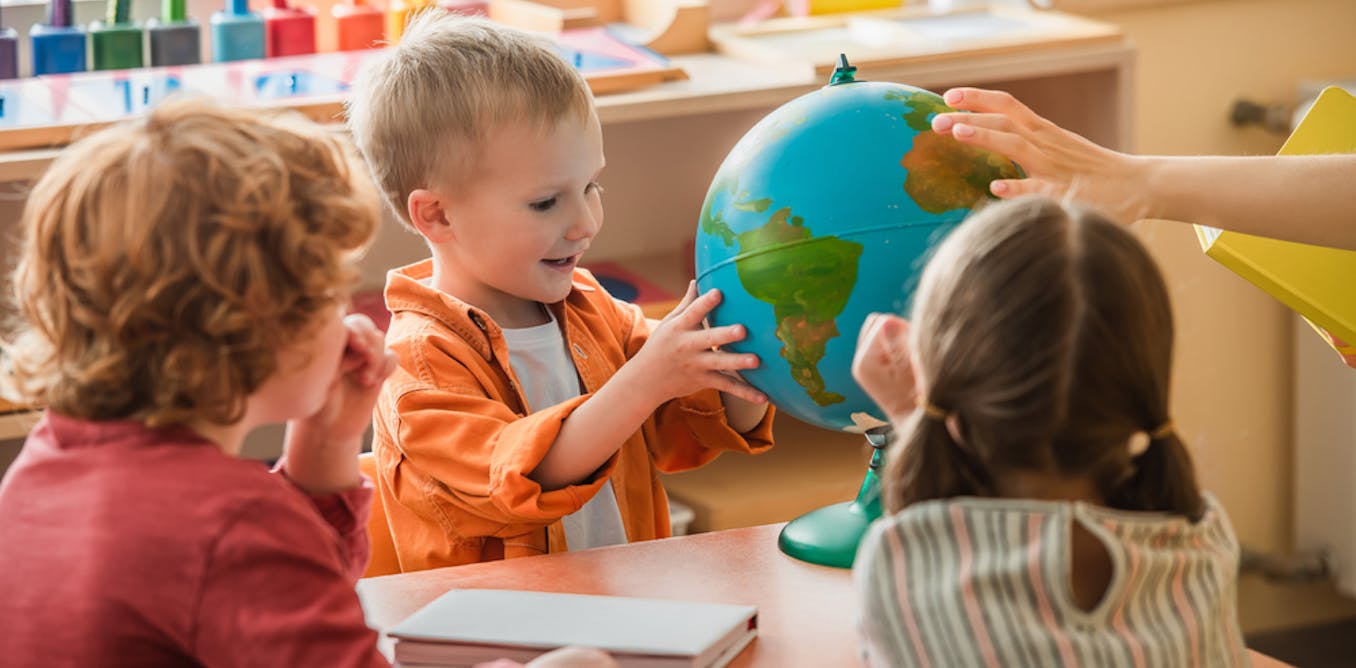Walk into any bookshop these days and you will find Montessori-labelled books and games galore. Born at the start of the 20th century, Montessori teaching methods have enjoyed increasing popularity in Europe over the past 20 years.
But what does the science tell us about the effectiveness of Montessori education compared with other forms of teaching? Is the method, which is now more than 100 years old, still relevant to modern life?
The ABCs of Montessori education
Founded on a number of key principles, Montessori education believes children will learn better if we entrust them with more freedom. Its curriculum is divided into several discovery areas dedicated to practical and sensory life, languages and mathematics. It’s also worth noting that children work in multi-age groups according to their development stage, respectively broken down into 0-3, 3-6, 6-9, 9-12, 12-15, and 15-18 years old cohorts.
The equipment in the classroom encourages children’s sense of independence by empowering them to correct themselves. In such an environment, the teacher is there to keep an eye on the child to respond to their needs, support them in their initiatives and redirect them if necessary.
Read more:
Pédagogie Montessori : les ressorts d’un engouement qui dure
In addition, the Montessori environment enables embodied cognition. According to this theory, sensory-motor interactions with our environment boost cognitive development and learning in children. In other words, we learn better by interacting physically with the environment. Montessori materials involve several senses, in particular touch and sight.
One emblematic piece of the Montessori toolkit are its physical letters. Made of rough material, such as sandpaper, they allow children to feel their way through the lines of alphabetical letters through touch, and then to pronounce them. The same goes with sets of physically tangible numbers. Through sight and manipulation, children can therefore strengthen their understanding of the links between spatial and mathematical representation of a number.
Shutterstock
And contrary to popular belief, Montessori does not mean unlimited freedom. The classroom is governed by a set rules, which are carefully enforced by the adults at school. While one of the aims of this teaching method is to adapt to each individual’s pace, respect for others and their work is also key. In line with this principle, pupils in Montessori schools receive neither rewards nor punishments, which helps to support pupil cooperation while encouraging intrinsic motivation.
It would appear that the Montessori teaching method has all of the ingredients to champion a child’s education and psychological development. Studies conducted over the last thirty years appear to support this view, suggesting that various aspects of Montessori teaching methods could benefit children’s cognitive abilities, social skills, creativity, sensorimotor development and academic results.
However, up until now, there has been no comprehensive study that has been able to draw any real conclusions about the effects of Montessori teaching methods. Our recent research published in Contemporary Educational Psychology does just that.
Better grades and social skills
A meta-analysis is a statistical synthesis of several empirical studies on the same subject. The aim is to determine the trend, positive or negative, of all the studies of the phenomenon under study. We therefore contrast the results of experimental groups (schools or classes using the Montessori pedagogy) with those of the control group (schools or classes using another pedagogy). Thanks to bibliographic database, we were able to pore over 109 articles published over the last 30 years. In total, the studies scoped out more than 21,000 schoolchildren in North America, Asia and Europe. We specifically looked at how they performed in the areas of academic learning, cognitive development, social development, sensorimotor development and creativity.

Shutterstock
The results of this meta-analysis show that Montessori teaching methods have significant positive impacts on social skills and school results. Compared with other forms of teaching, Montessori’s approach enables students to better grasp social situations, solve social problems, and put themselves in other people’s shoes. Various features of Montessori’s approach are thought to encourage the development of social skills, such as valuing cooperation over competition, and encouraging mutual respect and sharing.
Montessori also makes a significant contribution to improving pupils’ results in maths, reading, writing and other subjects. This contribution is linked to the multi-sensory and self-correcting materials in the classroom, but also to the absence of punishments and rewards, which encourage children’s intrinsic motivation.
We did not note any differences according to school level (nursery or elementary), the type of journal in which the study was published (peer-reviewed or not) or the geographical area in which the study was conducted.
Lesser impacts on other (less studied) areas
The impact of Montessori pedagogy on other areas was not notable. For example, the teaching method benefited only very slightly cognitive skills, which include memory, inhibition, attention span, planning as well as IQ. This could be because children are more likely to exercise their cognitive skills through school tasks themselves than through a particular teaching method.
Children also experienced an uptick in creativity, but not one we would consider as significant. Such results jar with the widespread narrative that Montessori education’s holistic approach boosts children’s creative development more than conventional schooling. However, given there were only four studies on the subject, we ought to approach these conclusions with some caution. It would be good to carry out more research across different cultures and contexts.
Montessori education had a mild impact on what is known as sensorimotor learning – the baby and child’s ability to carry out increasingly precise and willed gestures and movements from one to 36 months. Again, more research on the subject is needed and the small number of studies we based ourselves upon require that we approach these results with a pinch of salt. The scores were all the more surprising that the Montessori teaching method includes many activities to refine children’s motosensory developmemt.
All in all, the impacts of Montessori education on children’s development and learning vary from low to high. Future research would benefit from controlling for more variables, such as families’ socio-economic background, or the extent to which Montessori teaching methods have been implemented. Indeed, as various studies have shown, it would appear that a holistic approach to this method is more effective than its partial use.



